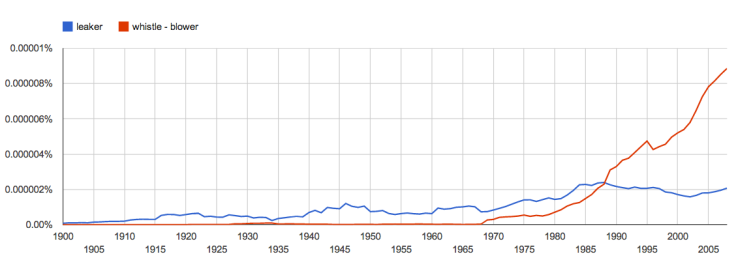Photos of Edward Snowden, a contractor at the National Security Agency (NSA), and U.S. President Barack Obama are printed on the front pages of local English and Chinese newspapers in Hong Kong in this illustration photo, June 11, 2013.
What’s in a name? Plenty when it comes to titles for Edward Snowden. A poll released this morning by Quinnipiac University found that more Americans believe the man who disclosed confidential NSA information is a “whistle-blower” than a “traitor.” The survey did not, however, provide a third option for the middle ground, like “leaker” or “sorry, Quinnipiac, neither of those quite fits.”
Since Snowden started dominating the news, media outlets have grappled with what exactly to call him, because it matters. Yes, there are legal reasons, but for culture at large, the distinction is often about connotations of righteousness and wrongdoing. Calling him a whistle-blower, as supporters of Bradley Manning call the WikiLeaks source, has noble connotations; it conjures a martyr who will shed sunlight on immoral behavior for The People’s sake, whatever the cost to himself—though that wasn’t always the case. Calling him a traitor is, of course, less celebratory, while leaker lies in more neutral territory between the two.
The Associated Press, makers of an established stylebook guiding journalists’ on proper usage, recently issued guidance on the Snowden question: “A whistle-blower is a person who exposes wrongdoing. It’s not a person who simply asserts that what he has uncovered is illegal or immoral. Whether the actions exposed by Snowden … constitute wrongdoing is hotly contested, so we should not call them whistle-blowers on our own at this point.” That means for AP writers, that term is off limits, at least for now.
The AP editors go on to say that public opinion is one factor that will eventually determine the right label. According to the Quinnipiac poll, 55% of Americans would currently call Snowden a whistle-blower, while 34% would call him a traitor and 11% can’t choose between the two. When media outlets try to avoid making that call, the result can be overwrought—the linguistic equivalent of getting around a wreck in St. Louis by avoiding Missouri altogether. In a New York Times article, for instance, a writer referred to Snowden as one “who has acknowledged leaking numerous documents.”
Linguist Ben Zimmer, who writes a weekly column for the Wall Street Journal, dug into the history of whistle-blower, which comes from an earlier idiom, to blow the whistle (on). (You’ll be able to read his deep dive this Saturday here.) In the early days, blowing the whistle simply meant to stop something going afoul, like a referee in a boxing match. In the 1930s, Zimmer says, whistle-blower took on a negative spin, becoming the equivalent of “snitch.” A critic of Teamster boss Jimmy Hoffa actually disparaged him as a “notorious fink” and “whistle-blower” in 1960.
Then the 1970s hit and politician Ralph Nader gave the term a makeover. “He was looking for a label that could fit these responsible, civic-minded people working in corporations or government who would step up and report fraud or negligence,” Zimmer says. “He recognized that there was the whole class of terms—like rat, fink, squealer, informer, stool pigeon—and I guess he saw whistle-blower as the easiest to salvage or rehabilitate.” Once Nader salvaged that title, the word’s usage took off.

Today, dictionary definitions stake out the high ground for whistle-blower and the neutral, or lower ground, for a leaker. The American Heritage Dictionary defines a “whistle-blower” as “one who reveals wrongdoing within an organization to the public or to those in positions of authority.” The Oxford English Dictionary outlines a leak as “an improper or deliberate disclosure of information (e.g. for political purposes).”
Zimmer has traced the “leak” metaphor back to ancient Rome, when a leak described information seeping out like water coming through a leaky roof or shoddy boat hull. In the early 1900s, leak was often used in the passive tense—“information leaked”—without assigning responsibility. In the Deep Throat era, Zimmer says, the word took on a more active sense, describing things people did rather than things that had, you know, just happened.
It’s hard to argue, however you feel about Snowden, that he didn’t leak something. “It’s helpful to introduce him in a terse way and leaker does that,” Zimmer says. “People think of it as more neutral.” And though Quinnipiac didn’t ask Americans if leaker was the best desciptor, most news outlets seem to have come to that conclusion by now. A Lexis news search for “whistle-blower Edward Snowden” turns up 514 results, from all time. The same search for “leaker Edward Snowden” turns up that many in just the past five days.
This is an edition of Wednesday Words, NewsFeed’s weekly feature on language. For the previous post, click here.






